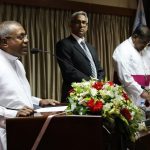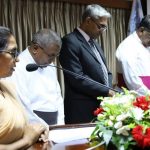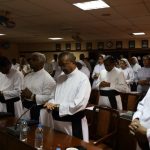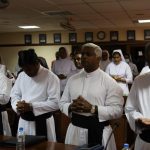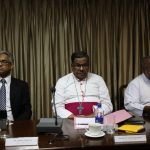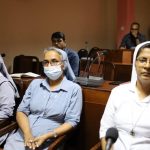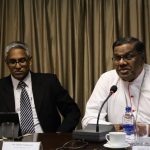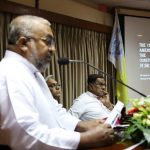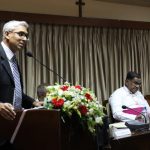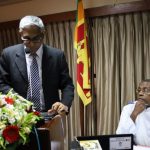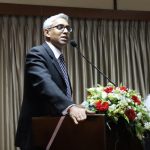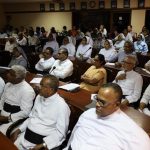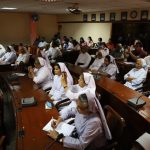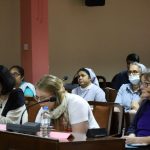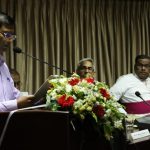Caritas Sri Lanka – SEDEC organized a study session on the 13th amendment to the constitution on, which was conducted by Mr. Suren Gnanaraj, Counsel – Attorney-at-Law with the participation of Rev. Fathers and Catholic Nuns representing different congregations.
The program was facilitated by Rev. Fr. Bennette Mellawa, Director- Caritas Anuradhapura who highlighted during the introduction to the session on the fact of ideological maneuvering aimed at elimination of power decentralization as a concept and of varied majority and minority concerns over the 13th amendment.
Rt. Rev. Dr. Justin Ganapraksayam, the Bishop Chairman of CBCSL, delivered the opening remarks in which he pointed out that when we stop talking about the minorities in Sri Lanka, then Sri Lanka would come to a new state. 13th amendment is not proposing a federal structure which is a negative stance that people hold on this.
Rev. Fr. Luke Nelson Perera, the national director of Caritas Sri Lanka, SEDEC addressed the gathering where he introduced the speaker Mr. Suren Ganyaraj, attorney at law after welcoming the participants.
During the discussion, attorney-at-law Mr. Suren Ganyaraj highlighted that although the 13th amendment was passed, its execution has been a topic of discussion. As per the constitution, ultimate power lies with the people and is delegated to vital branches of the government. The concept of sovereignty is divided into government power, electoral rights, and fundamental rights. The government is responsible for utilizing this power, and a social contract exists between the people and the state. The public appoints leaders, and in cases where leaders fail to act in good faith, the people have the right to elect new leaders. Parliament is granted the authority to create laws, both for the present and the future.
The 13th Amendment was introduced as a mechanism for power sharing, which aimed to manage local issues with local bodies while leaving matters affecting the whole nation under the control of the central government. It was designed to fill a gap in governance. The provincial council election is a prerequisite for implementing the 13th Amendment, but concerns have been raised that this may undermine the unitary structure of Sri Lanka. Some argue that the government is functioning well without the provincial council, while others claim that it weakens the power of the central government. Another school of thought suggests that the executive presidency is necessary for effective governance, and its absence could create problems.
The merger of the northern and eastern provinces after the Indu-Sri Lanka code in 1987 did not address the immediate issues faced by the people, as the 13th Amendment does not grant sufficient power. The constitution’s directives emphasize the importance of decentralization in strengthening and expanding the democratic rights of the government, according to Article 27(4).
During the bill stage, the constitutionality of the 13th Amendment was challenged, arguing that it violated the basic structure of Sri Lanka as a unitary state. Passing statutes that contravene parliamentary law is also a concern. The Chief Minister is the executive of local bodies, and appointing them would be a constitutional breach. Some argue that sovereignty is indivisible and that issues regarding the supremacy of parliament and the absence of lawmaking bodies need to be addressed. Parliament has the power to make laws that invalidate those made by sub-ordinary bodies, thus countering the argument that the provincial council is parallel to parliament.
The governor serves at the pleasure of the president and must act in accordance with their directives. The 13th Amendment was a power-sharing agreement that did not compromise the unitary structure of Sri Lanka in any way.
Federalism and devolution differ in their operation, as federalism creates an autonomous body, while devolution is subordinate. In a devolved structure, the decision of the Supreme Court is final. The 13th amendment includes provincial high courts, which provide forums closer to home with lower litigation costs. However, the president holds a lot of power over the provincial councils. The dynamic change brought about by the 13th amendment is that provincial councils can make statutes that affect their province, but not on matters such as national defense, security, and the use of armed forces. Similarly, the government must comply with local authorities regarding land use in provinces, and consultation is mandatory, although it does not necessarily mean the advice will be followed. In discussions on power devolution, issues regarding minority oppression were also raised.


